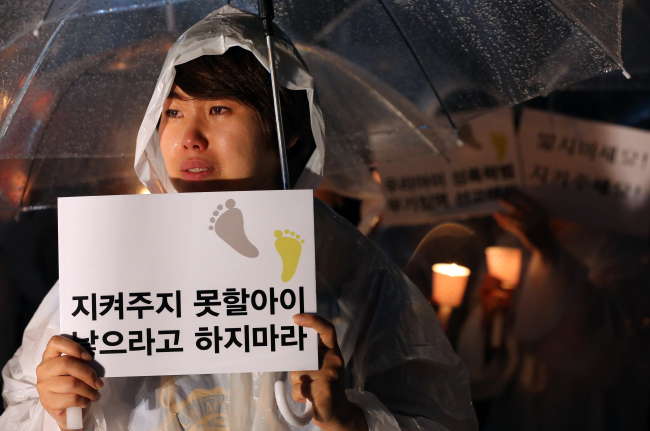Experts voice need for more fundamental solutions to growing social ill
Assembly Voice looks into key issues and controversial bills through interviews with rival lawmakers who lead the legislative debate at the National Assembly. ― Ed.
South Korea has been terrorized by a series of heinous sex crimes over the past month. Some were committed by repeat offenders, raising questions over the country’s ability to prevent and punish the violent crimes.
On Aug. 21, a young mother of two was killed by an ex-con who was wearing an electronic tracking device at the time, after a failed rape attempt.
Public outrage grew further when a 23-year-old man kidnapped a 7-year-old from her home in Naju, South Jeolla Province, and brutally raped her on Aug. 30.
The case prompted President Lee Myung-bak to issue a public apology and the government and political parties to scramble to prepare measures to deal with the crimes.
Data compiled by the Supreme Court shows that the number of juveniles committing sex offenses against other minors surged 11-fold in a decade.
Assembly Voice looks into key issues and controversial bills through interviews with rival lawmakers who lead the legislative debate at the National Assembly. ― Ed.
South Korea has been terrorized by a series of heinous sex crimes over the past month. Some were committed by repeat offenders, raising questions over the country’s ability to prevent and punish the violent crimes.
On Aug. 21, a young mother of two was killed by an ex-con who was wearing an electronic tracking device at the time, after a failed rape attempt.
Public outrage grew further when a 23-year-old man kidnapped a 7-year-old from her home in Naju, South Jeolla Province, and brutally raped her on Aug. 30.
The case prompted President Lee Myung-bak to issue a public apology and the government and political parties to scramble to prepare measures to deal with the crimes.
Data compiled by the Supreme Court shows that the number of juveniles committing sex offenses against other minors surged 11-fold in a decade.

Although sex offenders tend to have a high rate of recidivism, the monitoring system on them has been criticized as being only lightly enforced.
From July 2010 to the end of August this year, prosecutors sought electronic tracking devices for 2,709 sex criminals. But the court only ordered 429, or 15.8 percent of them, to wear the devices. Another 233 cases were denied, while 2,047 were put on hold. Of the 2,047, about 20 were arrested again for more offenses.
With the elevated alert over the safety of women and children, the ruling Saenuri Party and the opposition Democratic United Party have each set up special committees to tackle sex crimes. They are actively hosting forums on preventive measures, and drawing up scores of bills ― including a controversial proposal by Saenuri Party Rep. Park In-sook, who proposed physical castration for child rapists.
The government is also preparing new bills, such as expanding chemical castration to include those convicted of sex crimes against minors under 19, raising the age limit by three years, and retroactively applying the law on disclosing personal information of convicted sex offenders against minors.
Chief Justice Yang Sung-tae also said Sunday that the law should be changed so that sex offenders can be punished even without the victim’s formal complaint from a victim
While the heightened awareness against sex crimes is encouraging, experts point out that the measures should be less sensationalist and more fundamental.
Practical tasks to be tackled include systematic loopholes in searching the location of those wearing electronic tracking devices, collecting and sharing DNA data, and releasing the personal information of ex-convicts.
The experts also underscore that most of the prepared measures concern post-crime penalties, while the focus should also be placed on prevention such as through proper sex education and research into the mental states of sex offenders.
More importantly, the current legal criteria acknowledging rape is still restricted, the experts say.
“Precedent shows that in order for a rape to be valid, assault and threat must have taken place. And in order to deem there was an assault and threat, (the precedents have) consistently demanded that at the minimum, the assault and threat should have been at a level where it was impossible or very difficult for the victim to fight off (the offender),” the National Assembly Research Service said in its report on Sept. 13.
“Hence, the trial initially on clarifying whether the suspect committed rape turns into a so-called ‘trial of the victim’ by grilling why the victim could not seek help or resist the assault,” the report said.
Some U.S. states, on the other hand, do not make a victim’s resistance a precondition for conviction, while others deem “earnest” or “reasonable” resistance to be sufficient.
As a practical alternative for Korea, the report suggested easing the required level of assault and threat for a sex crime to the level applied for indecent assault.
By Lee Joo-hee (jhl@heraldcorp.com)
-
Articles by Korea Herald

















![[KH Explains] Hyundai's full hybrid edge to pay off amid slow transition to pure EVs](http://res.heraldm.com/phpwas/restmb_idxmake.php?idx=652&simg=/content/image/2024/04/18/20240418050645_0.jpg&u=20240418181020)

![[Today’s K-pop] Zico drops snippet of collaboration with Jennie](http://res.heraldm.com/phpwas/restmb_idxmake.php?idx=642&simg=/content/image/2024/04/18/20240418050702_0.jpg&u=)